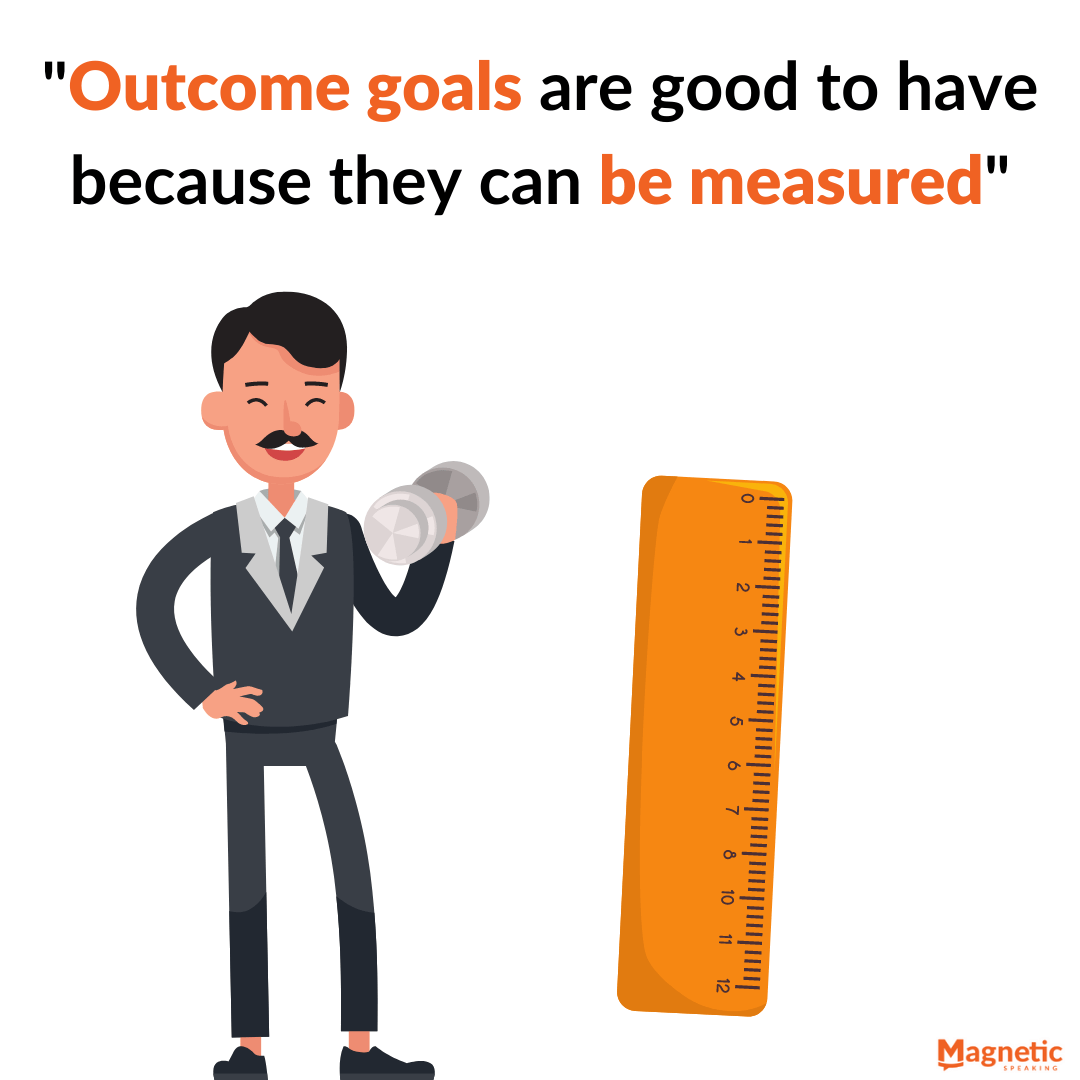It’s a new year! Have you thought about specific communication goals for yourself?
If you haven’t or need help, I’ll break down how to set communication goals for yourself in this article so that your goals are achievable and yield positive results for your career.
Aspirational Goals
When setting your communication goals (and goals in general), I recommend splitting them into three parts: Aspirational Goals, Outcome Goals, and Process Goals. This way, you’ll avoid the mistake of making goals that are either unachievable, too vague, or hard to follow through on. Let’s cover Aspirational Goals first.
Aspirational goals are different from other types of goals. They aren’t what you want to do, but rather how you want to be. They go deeper into the qualities you convey and the feelings you have. By setting these aspirations, you make sure that your specific goals are ones you actually care about.
Here are some examples:
- I’m charismatic.
- I’m confident in any work situation.
- I’m influential.
- I’m seen as a leader.
- I’m inspiring to others.
- My team trusts me to present.
Notice that aspirational goals are general. You can’t exactly measure success or failure. And with all of these, you can keep improving. You can always earn more trust, be more influential, or be more charismatic. And that’s the point. Aspirational goals are more general than other types of goals and provide the container for your more specific goals; it reminds you why you’re doing what you’re doing – to become a certain type of person.
As a non-communication example, let’s say you had a specific goal to be able to run 10 miles. That goal could fit under the aspirational goal of “I feel healthy and in shape” or “I’m a runner.”
So think for a moment. What are a few aspirational communication goals for 2021? Write them down where you can see them. And do it now!
Outcome Goals

Now that you’ve set aspirational goals, which you strive to continually grow into, it’s time to set outcome-based goals that are measurable and help you move towards your aspirational goals.
Outcome goals have a tangible and measurable metric associated with them. These are important to have in addition to the aspirational goals because these will be milestones for you to aim for.
An example would be a salesperson with a target of closing $200,000 in deals this year. But for you, since this article is about communication goals, think about how improving your communication skills can help you achieve something. Here are some examples:
- Present my project to the team in June
- Complete a full-day public speaking training by February
- Finish my pitch deck by end of Q1 and get funding for my startup
- Nail my executive presentation and get the promotion I want in Q4 this year
- I’ll sell at least $5,000 of my merchandise after presenting at the conference
Process Goals

With public speaking, it’s important to have process goals so you make consistent improvements.
Outcome goals are good to have because they can be measured. However, you can’t always control them 100 percent of the time. For example, you can want to sell $5,000 of merchandise after presenting at the conference but it’s not guaranteed you’ll hit it.
With process goals, you have full control over them. They typically don’t have an end date or final number. It’s a way to measure your work and energy put in. It’s the PROCESS to the outcome or aspirational goal. How do you know how to achieve your goals if you don’t know what you should be doing each day, each week, each month?
That’s why you have to break it down and create process-driven goals for yourself. Here are some examples:
- I’ll speak up at least one time in every meeting to share my opinion
- Will come to a public speaking class at least twice a month
- Work on reducing my filler words whenever I speak
- I always set the frame at the beginning of my sales calls
- Every time I have a presentation I’ll put a story in it
- Before every presentation I’ll visualize the audience as engaged, listening, and getting a lot out of it
With aspirational goals, outcome-based goals, and process goals, you have a complete system to set communication goals that are achievable, motivating, and align with your values. So let’s put it all together.
First, set an aspirational goal. “I am influential at work.”
Next, set the outcome goal that helps you achieve your aspiration. “Take a storytelling training by the end of February.”
Last, set a process goal. “I will use a new story in every weekly presentation I have.”
Now, you have a realistic way to become more influential at work. And you can set other measurable outcome goals and process goals to support that aspiration!
You’ve now learned how to set top communication goals for yourself in 2021 and any year to come. First, you set your aspirational goals. Those are more aligned to who you want to be, intangibles that can’t be measured as clearly, and skills that you’ll always want to improve. Then, to get there, you set your outcome-based goals. Which will lay out the final destination you’re shooting for. And finally, you set your process goals. Which will be the actionable steps that you need to take every day/week/month to hit the outcome-based goals so you can continually develop your aspirational based goals.




